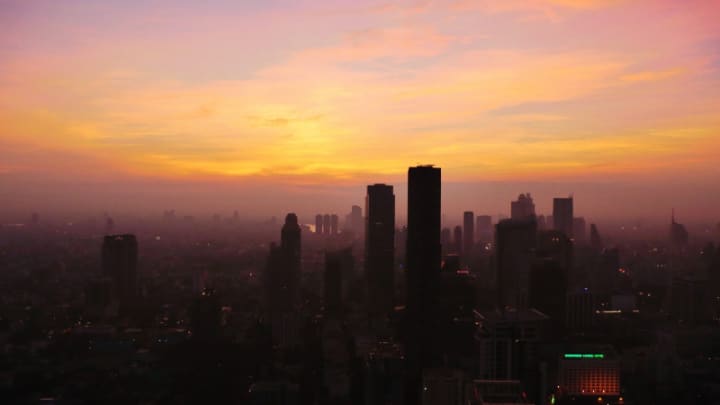
BANGKOK — Underneath a sky obscured in recent months by thick haze, residents and media in Bangkok are sounding the alarm on the effects of ongoing pollution. Discussions on how to create makeshift air filters in children’s classrooms, what costly purification system can ease asthma at home, and which mobile app most accurately reflects current air quality have become commonplace.
See more related topics:
► Cities emerge onto the climate change science agenda
► Opinion: Coal cannot end poverty. Here's what can.
► Climate, cybersecurity top list of global threats in new report
► Can these 'stovers' finally crack the clean cooking problem?
► Geneva meeting on used cars exporting pollution to developing countries
This unrest is welcome, according to Helena Molin Valdes, head of the Paris-based Climate and Clean Air Coalition. In fact, she hopes to see more concerned citizens armed with pollution data demanding cleaner air from their governments throughout Asia and the Pacific, she told Devex at an event during the United Nations Environment Programme-organized “Clean Air Week” in Bangkok.
The World Health Organization calls air pollution a “silent killer,” and the greatest environmental risk to human health. Approximately 70 percent of the 6.5 million deaths linked to air pollution each year occur in the Asia-Pacific alone, according to UNEP.
Of particular concern is the level of PM2.5 — breathable particles linked to respiratory and cardiovascular diseases. In Bangkok, a city of 8 million people, levels of the harmful particles have been alarmingly high in recent months: 200 micrograms of PM2.5 was recorded in the nation’s capital in early February, four times the WHO’s suggested limit.
Much of the pollution in Bangkok, and in the region at large, can be traced to open burning, transportation, and electricity generation. In the last five years, thanks to dedicated scientific advisory councils and global bodies including the Climate and Clean Air Commission, there is an increasing awareness about the impacts these unclean or unregulated practices have on health, crops, and climate change, according to Molin Valdes.
“But we need the interest from the public that there is a problem,” she said. “What is happening in some cities around the world, there are strikes. People go out on the streets, demand cleaner air, this is what we need.”
Instead, governments with intentions of introducing stricter policies that affect major industries are often met with pushback. It’s something Molin Valdes witnessed in France, when the government sought to introduce strict fuel restrictions for diesel: “The whole fleet of trucks went on strike, and the first thing the new government did was scrap that law,” she said. “But if you have a public that understands the connection, even if the truck drivers had 10 years to change their vehicle fleets to comply, it’s a step.”
In Asia-Pacific, the Climate and Clean Air Coalition supports capacity building and the development of national action plans on short-lived climate pollutants for close to 20 countries. But one priority area is equipping the public with the necessary information to rally for change through the BreatheLife campaign, in partnership with UNEP and WHO.
“It’s not only about the fear of dying earlier, it’s empowering people of what they can actually do,” Molin Valdes said of the campaign’s goal to highlight actionable steps for individuals.
Mongolia’s minister of environment recently introduced the Green Passport for Youth initiative in the country’s high schools. Government’s inaction to curb the toxic smog Ulaanbaatar has become known for sparked organized protests on the streets of the capital this past winter.
One of the solutions the Mongolian minister saw as far as changing people’s behavior, Molin Valdes explained, was creating a youth movement — giving students tasks like informing of air pollution sources they find, filming pollution they see and sharing it online, and encouraging their own families to recycle and move away from cooking with coal.
Those informed of pollution’s harm “are not telling enough stories to bring the truth home and encourage more people to act upon that truth,” according to Dia Murza, a Bollywood actor and U.N. Environment goodwill ambassador. Murza referenced a movement established by mothers in Delhi — where just breathing has been likened to smoking nearly 50 cigarettes a day — who came together to set up meetings with schools, hospitals, and media to help convey the causes of the problem and engage the government on solutions.
“I think that representation of educated women in the capital of the country coming together, and saying ‘this is enough, my fundamental right to life is my right to breathe and if I cannot guarantee my child that basic right, then what kind of a parent can I ever hope to be?,’ that is powerful.”
Global bodies and U.N. agencies in Asia-Pacific, a key battleground in the fight against air pollution, will continue to study what’s working, Molin Valdes said, and more importantly equip citizens with those “sunshine stories.”
“There is no global air pollution agreement or agency, and there is not a political party or president who would buy into reducing the benefits of our wealth so to speak,” Molin Valdes said. “The only way the politician is willing to take the risk of putting these issues at the forefront [is] if they know they will win elections on it.”
